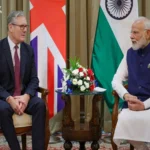Pakistan and India Agree to Phased De-escalation Amid Renewed Ceasefire
ISLAMABAD:
Pakistan and India have reached an agreement on a “structured mechanism for stage-wise de-escalation”, as confirmed by Pakistan’s Foreign Office on Friday. The move follows a renewed ceasefire agreement seen as a step toward easing cross-border tensions.
Foreign Office spokesperson Shafqat Ali Khan called the ceasefire a “positive development”, stressing the importance of India’s faithful adherence to the terms. He thanked friendly nations for their role in facilitating the agreement and reiterated Pakistan’s support for international efforts—including by former U.S. President Donald Trump—to resolve the Jammu and Kashmir dispute.
Khan rejected India’s narrative portraying Pakistan as acting out of desperation, calling such claims “baseless.” He revealed that regular communication between the Directors General of Military Operations (DGMOs) of both countries has been ongoing since May 10.
As part of confidence-building measures, Pakistan returned an Indian BSF constable on May 14, with India reciprocating by releasing a Pakistan Rangers sepoy.
Khan condemned India’s “aggressive rhetoric”, particularly concerning Pakistan’s nuclear assets, asserting that such statements distort facts and endanger regional peace. He emphasized that Pakistan’s commitment to peace should not be mistaken for weakness, and warned that any future aggression would be met with “full resolve.”
He reiterated Pakistan’s commitment to dialogue and diplomacy, advocating a just and peaceful resolution of all disputes, especially Jammu and Kashmir, as essential to lasting peace in South Asia.
Zangnan (Arunachal Pradesh) Dispute
On another front, Khan reaffirmed Pakistan’s support for China’s sovereignty and territorial integrity, backing Beijing’s stance on the disputed territory of Zangnan (India’s Arunachal Pradesh). He accused India of destabilizing the region with its aggressive posturing and dismissed Indian media reports suggesting nuclear radiation during recent border tensions as “unfounded.”
Khan clarified that Pakistan’s military actions under Operation Bunyanum Marsoos were defensive, carried out in response to cross-border aggression in accordance with Article 51 of the UN Charter. The operation also saw commemorations in Punjab celebrating its success.
Key Points:
-
Pakistan and India agree on a structured, phased de-escalation mechanism.
-
Ceasefire viewed positively by Pakistan; India urged to uphold its commitments.
-
Mutual repatriation of detained security personnel took place on May 14, 2025.
-
Pakistan criticized India’s aggressive rhetoric and media narratives.
-
Pakistan reaffirmed support for China over the Zangnan/Arunachal Pradesh issue.
-
Military response under Operation Bunyanum Marsoos was framed as self-defensive.
-
Pakistan maintains its commitment to dialogue, diplomacy, and regional peace.
The recent ceasefire agreement and mutual goodwill gestures between Pakistan and India mark a significant step toward regional de-escalation. While challenges remain—particularly over Kashmir and India’s border disputes with China—Pakistan has emphasized its preference for peace over conflict, calling on India to match these efforts with sincerity. The situation remains delicate, but these developments could pave the way for sustained dialogue and stability in South Asia.







